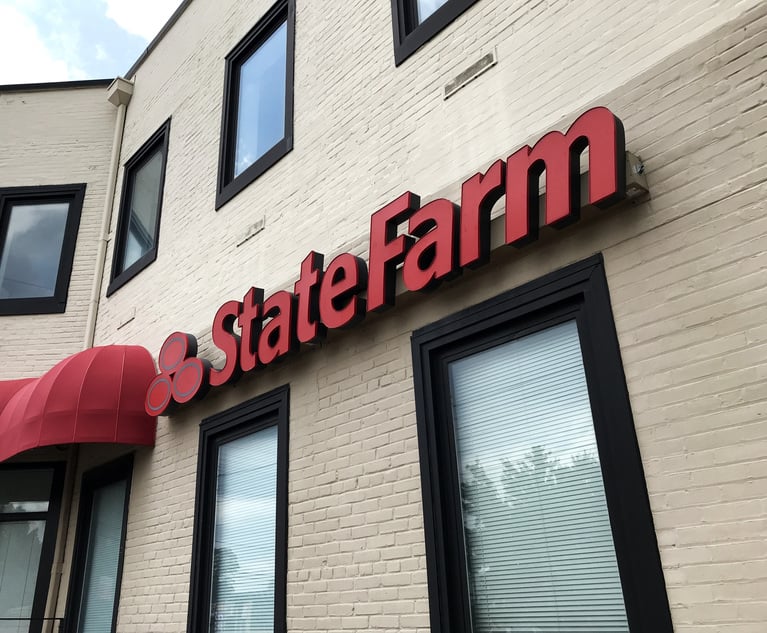Washington
|A provision in financial services reform legislation to beintroduced in the Senate this week–which will subject largeinsurers to federal systemic risk oversight and force them to helpbail out even non-insurance firms–is running into heavy fire fromvarious industry groups, including state legislators.
|Drawing particularly heavy criticism is a provision of thesystemic risk provision that would require insurers with assets ofmore than $50 billion to contribute to a fund that would be used topay for winding down troubled large financial services firms.
| The proposal is running intostrong resistance from various industry groups, including theNational Conference of Insurance Legislators, and trade groupsrepresenting state guaranty funds.
The proposal is running intostrong resistance from various industry groups, including theNational Conference of Insurance Legislators, and trade groupsrepresenting state guaranty funds.
A new coalition of 11 property and casualty insurers that arelikely to be among the group of financial services companies withassets of $50 billion or more has also joined the battle.
|The provision will be included in financial services reformlegislation to be introduced this week. Sen. Chris Dodd, D-Conn.,chair of the committee, and Sen. Bob Corker, R-Tenn., arecoordinating the drafting of the bill.
|The systemic risk provision will call for raising $50 billionupfront from companies with assets of more than $50 billion. Butthe provision will also allow the government to require the largecompanies to be responsible for providing additional funds ifnecessary to pay for resolving a troubled, systemically riskyfirm.
|The provision is expected to designate the Federal DepositInsurance Corp. as responsible for winding down troubledcompanies.
|It is unclear whether the provision will mandate that states beresponsible for dealing with operating subsidiaries, such asinsurance carriers.
|But the industry is opposed. Generally, they argue that theinsurance industry has a viable resolution system for failedcarriers and should be excluded from the federal system that wouldbe created under the emerging Senate bill.
|A letter to Sens. Corker and Dodd sent by officials of theNational Organization of Life and Health Insurance GuarantyAssociations and the National Conference of Insurance GuarantyFunds argues that insurance companies are fundamentally differentthan banks.
|It explains that the existing guaranty fund system is designedto protect consumers above commercial interests in any liquidation,and that creating a new system would undermine the existingguaranty system used to resolve troubled insurance companies.
|"A proposal to resolve insurer failures directly, in a newresolution regime that would not protect or effectively replicatethe priority status of policyholders (and of the 'safety net'protecting policyholders), perversely could leave policyholders atgreater risk of incurring financial harm in connection withinsurance company receiverships than they are today," the lettersaid.
|In addition, a resolution adopted by the National Conference ofInsurance Legislators at its recent spring meeting asks thecommittee to exclude the insurance industry from systemic riskregulation, federal resolution authority and assessments to fundthe resolution of systemically risky financial firms.
|The resolution argues that insurance activities generally do notcreate systemic risk and that existing state guaranty fund systemsare the appropriate venues to unwind failing insurancecompanies.
|It also states that insurers should not be forced to pay for theresolution of failing systemically risky non-insurers.
|Meanwhile, the coalition of 11 insurance companies also sent aletter to Sens. Dodd and Corker, as well as other members of thecommittee. "Property and casualty insurers have been an oasis ofrelative stability, weathering the crisis well without presentingany risk to the broader financial system," the letter said.
|They added that property and casualty insurance operations aregenerally low-leveraged businesses, with lower asset-to-capitalratios than other financial institutions, more conservativeinvestment portfolios, and more predictable cash outflows that aretied to insurance claims rather than "on demand" access toassets.
|Moreover, the letter said, "property and casualty insurers arealready subject to stringent regulatory capital, investment andproduct standards that focus on maintaining their financial healthand strength."
|Those signing the letter include the chairs and CEOs of ACE,Allstate, Berkley Corp., Chubb Corp., CNA, Liberty Mutual,Nationwide Insurance, State Farm, Travelers, USAA and Zurich.
Want to continue reading?
Become a Free PropertyCasualty360 Digital Reader
Your access to unlimited PropertyCasualty360 content isn’t changing.
Once you are an ALM digital member, you’ll receive:
- All PropertyCasualty360.com news coverage, best practices, and in-depth analysis.
- Educational webcasts, resources from industry leaders, and informative newsletters.
- Other award-winning websites including BenefitsPRO.com and ThinkAdvisor.com.
Already have an account? Sign In
© 2024 ALM Global, LLC, All Rights Reserved. Request academic re-use from www.copyright.com. All other uses, submit a request to [email protected]. For more information visit Asset & Logo Licensing.








